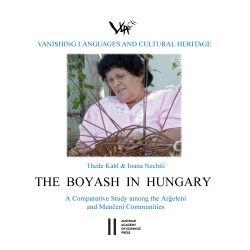Der vorliegende Band beschäftigt sich mit der Sprache und Kultur der "băiaşi" (Bajeschi) in Südungarn. Die von ihnen gesprochenen archaischen rumänischen Dialekte sind vom Aussterben bedroht, wobei die beiden Vernakularsprachen Arĝelean und Munĉan in unterschiedlichem Ausmaß betroffen sind. Das im Dorf Alsószentmárton gesprochene Munĉan befindet sich in der zweiten Phase des Sprachverfalls, in welcher die Minderheitensprache vom dominierenden Ungarischen aus dem Alltagsgebrauch in den häuslichen Bereich abgedrängt wird. Das im Dorf Gilvánfa und in Pécs gesprochene Arĝelean befindet sich in einer dritten Phase, die durch den Abbau des Vokabulars und den Verlust der Wortbildung gekennzeichnet ist – hier wurde die Sprache der Minderheit bereits durch jene der Mehrheit ersetzt. Faktoren wie Lebensumstände, soziale Strukturen, die Intensität des Sprachkontakts sowie ökonomische Abhängigkeit spielen eine entscheidende Rolle in der schrittweisen Ersetzung der Sprache der Boyash durch die Mehrheitssprache. Dieser Prozess spitzte sich in der zweiten Hälfte des 20. Jahrhunderts und insbesondere nach dem EU-Beitritt Ungarns dramatisch zu. In den letzten drei Jahrzehnten hat das Arĝelean gegenüber dem Munĉan an Prestige gewonnen, wodurch es sehr wahrscheinlich ist, das Ersteres die dominierende Vernakularsprache der Boyash werden wird, sofern diese in den Arĝeleni-Sprachgemeinschaften überhaupt überlebt.
…
The present book is concerned with the language and culture of the Boyash "Gypsies" in southern Hungary, who speak archaic dialects of Romanian and call themselves "băiaşi". Their varieties may be regarded as endangered, with the spoken vernaculars, Arĝelean and Munĉan, suffering different degrees of loss. The Munĉan vernacular investigated in the village of Alsószentmárton is most probably in the second stage of loss, during which the language of the majority increasingly spreads into the language of the minority, while the latter is used mostly within the family by the elderly. Hungarian is beginning to replace the Boyash language even in everyday life. The Arĝelean dialect from the village of Gilvánfa and from Pécs is in the third stage, which is characterized by the loss of vocabulary and the inability to create new words, as the majority language has definitively replaced the minority language. Factors such as way of life, social structures, the intensity of contact with the majority population, religion, the prestige of the language, the code function of minority languages and economic dependency have all played a decisive role in the progressive replacement of the Boyash language by the majority language Hungarian, a process that dramatically accelerated in the second half of the 20th century and especially after Hungary’s accession to the EU. In the last three decades, the Arĝelean vernacular has enjoyed greater prestige than the Munĉan and it is highly probable that the Arĝelean vernacular will become the dominant one if the Boyash language survives in the Arĝeleni communities.



 Home
Home
 Print
Print
 References
References
 Share
Share
